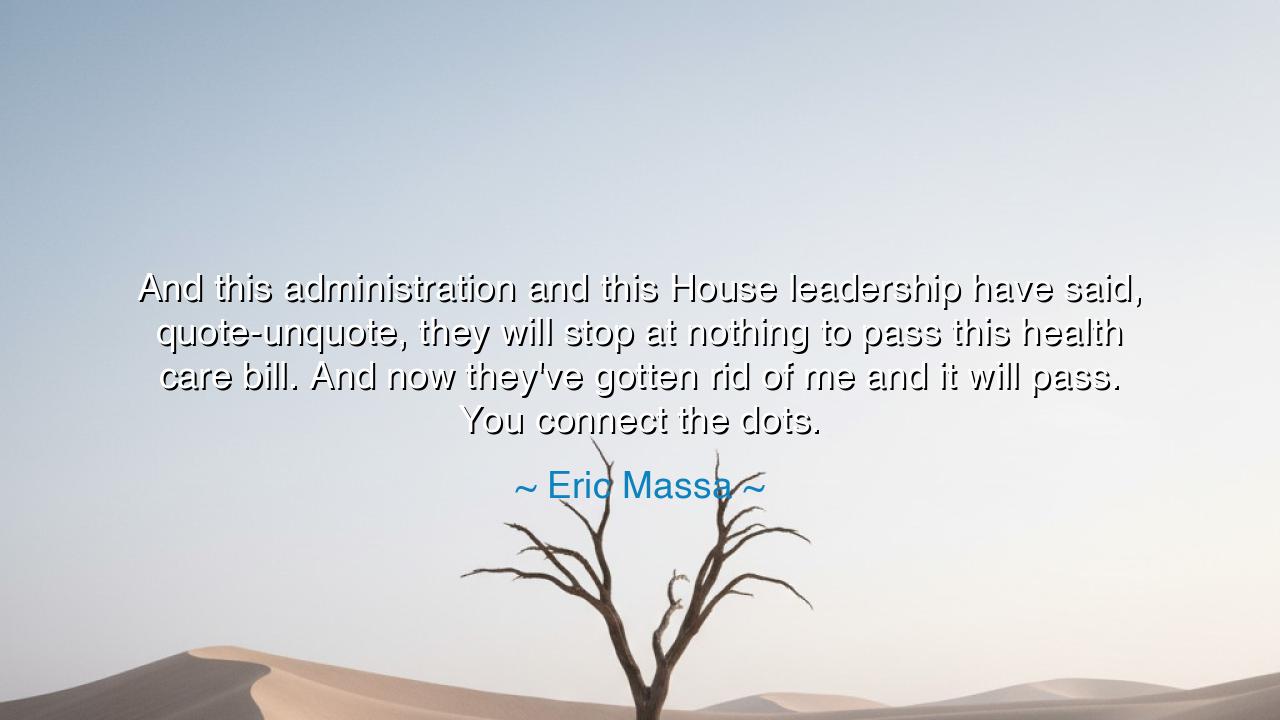
And this administration and this House leadership have said
And this administration and this House leadership have said, quote-unquote, they will stop at nothing to pass this health care bill. And now they've gotten rid of me and it will pass. You connect the dots.






The words of Eric Massa—“And this administration and this House leadership have said, quote-unquote, they will stop at nothing to pass this health care bill. And now they've gotten rid of me and it will pass. You connect the dots”—are more than the cry of a man at the edge of political downfall. They are the lament of one who has seen the machinery of power grind onward, relentless and cold, swallowing individuals in pursuit of an idea. Beneath his accusation lies a truth as old as governance itself: that ambition, once unrestrained, consumes both friend and foe, and that those who stand in its path are often sacrificed to the greater will of the state or the cause.
Massa’s words were spoken during the fierce debates surrounding the health care reform of his era—a time when the halls of Congress echoed with division, and power was exercised with the single-minded intensity of conquest. Yet his statement transcends its moment in history. It speaks to the dark rhythm of political determination, the point where noble purpose transforms into ruthless pursuit. “They will stop at nothing,” he says—not in admiration, but in warning. For when victory becomes more sacred than virtue, the very foundation of leadership begins to crumble.
This tension is as old as civilization itself. In the ancient world, the Roman Senate once sought to preserve the republic through law and tradition, yet it was undone by the ambitions of those who claimed to act in its defense. When Julius Caesar crossed the Rubicon, he did so believing his cause was just, that Rome needed his strength. But the act—like the passage of a bill at any cost—came with a price: the death of the republic and the birth of empire. Caesar’s rise was not the triumph of one man, but the surrender of many to the seductive logic of necessity. The lesson is eternal: when leaders justify every act in the name of a greater good, they risk replacing principle with power.
In Massa’s voice we hear not only outrage, but a kind of weary awe. He recognizes the scale of the forces moving around him—the machinery of politics, vast and impersonal. His fall, he suggests, is not an accident, but a consequence of the system’s hunger for results. “They’ve gotten rid of me, and it will pass.” It is the tone of one who sees that the individual has little defense against the tide of collective ambition. The dots he asks us to connect are not merely political—they are moral. They trace the shape of a truth humanity has long known: that power, even when born of idealism, carries within it the seed of corruption.
Yet within this lament there is also a call for discernment. Massa’s challenge to “connect the dots” is not just an accusation; it is an appeal for awareness. He urges us to look beyond the surface of rhetoric and promises, to question not only what is being done, but how and why. In every age, citizens must learn to read between the lines of power, to see the hands that move the levers behind the curtain. The wise must remember that truth rarely announces itself with trumpets; it whispers in the spaces between actions and words.
This moment mirrors many in history when idealism and ambition collided. Consider Robespierre, the architect of the French Revolution’s moral purity, who promised to cleanse the republic through justice—but whose zeal for righteousness led to terror. His cry of virtue became the justification for blood. Like the leaders Massa describes, Robespierre believed he would “stop at nothing” to achieve reform. In the end, he too was consumed by the very flame he had kindled. Thus, every generation must learn anew the peril of believing that ends justify means.
The lesson that emerges from Massa’s words is therefore not partisan but universal: power without restraint is a storm that spares no one. Leaders must temper conviction with humility, and citizens must temper loyalty with vigilance. When any movement, government, or ideology begins to believe that dissenters are obstacles rather than voices, the seed of tyranny has already been sown. To “connect the dots,” as Massa implores, is to see that moral blindness often hides behind the banner of progress.
So let this be the wisdom passed to future generations: pursue justice, but never at the cost of conscience. Build, but do not destroy those who question how you build. For the greatness of a nation does not lie in how fiercely it achieves its goals, but in how honorably it does so. And when power grows impatient, when the cry arises that “nothing will stop us,” it is the duty of the wise to pause and ask: at what price? For a cause that devours its own becomes not victory, but tragedy, and the history of the world is littered with the ruins of those who refused to see that truth.






AAdministratorAdministrator
Welcome, honored guests. Please leave a comment, we will respond soon